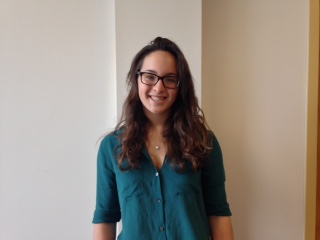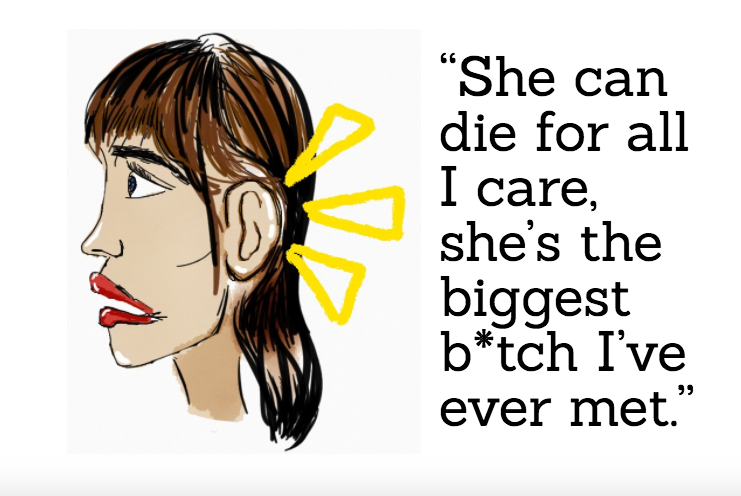Posters featuring obscene quotes have sparked both conversation and controversy across the school as part of a class project to raise awareness about offensive and insensitive language.
Seniors Jackie Williams, Sam Dickie, and Daniela Requena initiated the “Overheard at Algonquin” project to encourage dialogue amongst the student body. The posters were part of an assignment from their Silenced Voices class, which was designed and taught by English teacher Emily Philbin.
“Often in Silenced Voices, we have discussions and we talk about how issues are reflected at Algonquin,” Dickie said. “And most people say that, compared to other schools, Algonquin does a really great job [with limiting offensive language]. But that doesn’t undermine the fact that there’s still hate speech at Algonquin. We wanted to be blunt about it, to show how bad it really was.”
“In Silenced Voices, we’re talking about how we always hear people say bad things in the hallways, but we never really know what to do about it,” Williams said. “We were trying to do something that would get people’s attention and [make them] think about what they were saying instead of just shouting slurs throughout the hallways.”
“
That was the whole point of the project, to get people to talk about all the atrocious things people say that needs to be stopped. Think before you speak.
— Senior Daniela Requena
Williams, Dickie, and Requena were inspired by the Raising Awareness project, which Philbin assigns to her Silenced Voices class at the end of the semester.
“The idea was they had to pick an issue… and they had to create something and campaign around this school so they could raise awareness in their community, outside of the confines of the classroom,” Philbin said. “The group that did ‘Overheard at Algonquin’ actually overheard all of the things that they compiled. The idea was if people are going to say it in the hallway, maybe we should point it out in writing to show how hurtful it can be.”
“Ms. Philbin said she heard a lot in the hallways and encouraged us to listen,” Dickie said. “So we did, and then we decided to quote some of it and let other people know what goes on.”
Williams, Dickie, and Requena feel proud of the discussion their posters stimulated amongst students and faculty.
“I think it was necessary,” Requena said. “That was the whole point of the project, to get people to talk about all the atrocious things people say that needs to be stopped. Think before you speak.”
“I think it did exactly what I had hoped the project would do,” Philbin said. “What they did was start a dialogue in the school about those posters; both faculty and students have reacted very strongly to what they posted around the school. Every poster they had covered every oppressed group that we talk about, as well as reveal privilege, reveal stereotypes, reveal misconceptions and assumptions.”
Although the posters had the primary purpose of initiating dialogue in the school community, they still sparked controversy amongst the faculty and administrators. Certain posters which were considered too obscene were removed by administrators.
“What I found ironic was when we asked certain teachers to hang up the posters on their doors, some of them used freshmen as a reason as to why they wouldn’t hang it up, saying freshmen are immature and they wouldn’t want them using that language,” Dickie said. “But that was the point: if we don’t want them to use that language, then they need to know it’s not appropriate.”
Principal Tom Mead’s initial reaction to the posters included surprise and shock, “What the heck!” he said. Mead’s primary concern regarded the appropriateness of the posters for various age groups.
“This is a public school,” Mead said, “This is a school that opens its doors to students approximately at the ages of 13 to 14 all the way to 17 to 18, and we always have that to think about. Perhaps with increasing maturity, our programs, our courses, our messages to students might have some variance depending on the age of the students… That’s something for us to think about that’s something for everyone to think about when they put something on a public board.”
According to Mead, although the administration received no complaints or concerns from parents or students, another issue with the posters was the lack of evident attribution.
“We also have visitors walking through, we have parents walking through these hallways, so we have to think about that too,” Mead said. “Our billboards are public. All those posters should have to be approved by somebody. I appreciate knowing about things that might be controversial, that might be a little bit edgy. But I was quickly brought up to speed about what the source was, what the purpose of it was.”
Williams, Dickie, and Requena experienced moments beyond simply overhearing offensive language in the hallways as they have endured direct circumstances consisting of insensitive words.
“One of the quotes is what I’ve been told,” Dickie said. “I was walking down the hallway one day, and a student came up to me and asked me if I was trying to be a guy. He kept asking me and he told me I look like I’m a guy, and trying to convince me that I was trying to be something I wasn’t.”
Although the semester and their experience in Silenced Voices is coming to a close, the students will carry the lessons learned in class with them. Their project was a medium for them to disseminate the perspectives and mode of thinking they acquired in class to their fellow students.
“Before, I cared about minorities and oppressed voices but I didn’t take the time to learn about their history in detail,” Dickie said. “I think will pay more attention to the details and reasoning behind what people do now.”
“[The class] opened my eyes to being more aware as to why society is still in this conservative way and how it got there, and this class taught us to break apart from that,” Requena said. “It gave us mechanisms to fight against that and recognize the problem. We need to tell people what isn’t okay to say.”
“There were a lot of things I wasn’t aware of before I took that class, and now I’m going to try to make sure I’ll be more aware of oppressed people rather than just standing in the background like a bystander, which is what I did before,” Williams said. “This class definitely encourages kids to stand up.”



Valerie Burdette • Feb 8, 2017 at 6:03 pm
Thanks for the excellent article about this meaningful project.
Emily Philbin • Feb 8, 2017 at 5:07 pm
Carey, I just wanted to express my gratitude because posting this (wonderfully written!) article helps continue a very necessary conversation. Thank you!